Sustainable and Responsible Tourism: A Comprehensive Report
VerifiedAdded on 2023/01/11
|14
|4967
|32
Report
AI Summary
This report provides a comprehensive overview of sustainable and responsible tourism. It begins with an introduction to the concept and its growing importance, followed by an examination of the evolution of sustainable tourism and the roles of global organizations like UNWTO and WTTC. The report then delves into the principles and purpose of tourism development and planning, emphasizing the minimization of adverse effects and the importance of stakeholder engagement. It evaluates the processes of tourism development, including product, institutional, and sociological approaches, and discusses associated challenges. The report further explores the economic, social, cultural, and environmental impacts of tourism, along with how businesses implement sustainable practices. Finally, it analyzes the development and management of sustainability in various global destinations, offering critical insights into successes and failures, and concludes with recommendations.
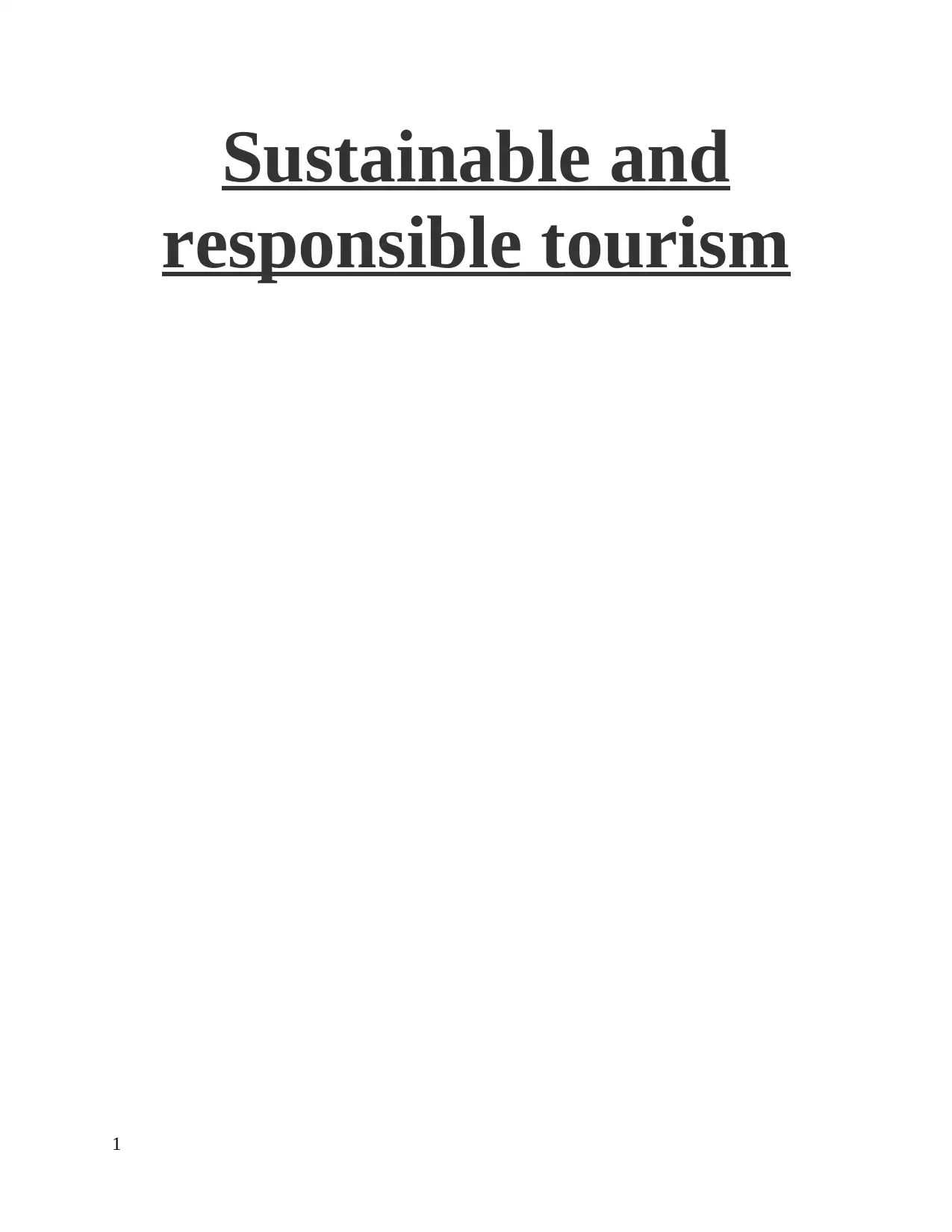
Sustainable and
responsible tourism
1
responsible tourism
1
Paraphrase This Document
Need a fresh take? Get an instant paraphrase of this document with our AI Paraphraser
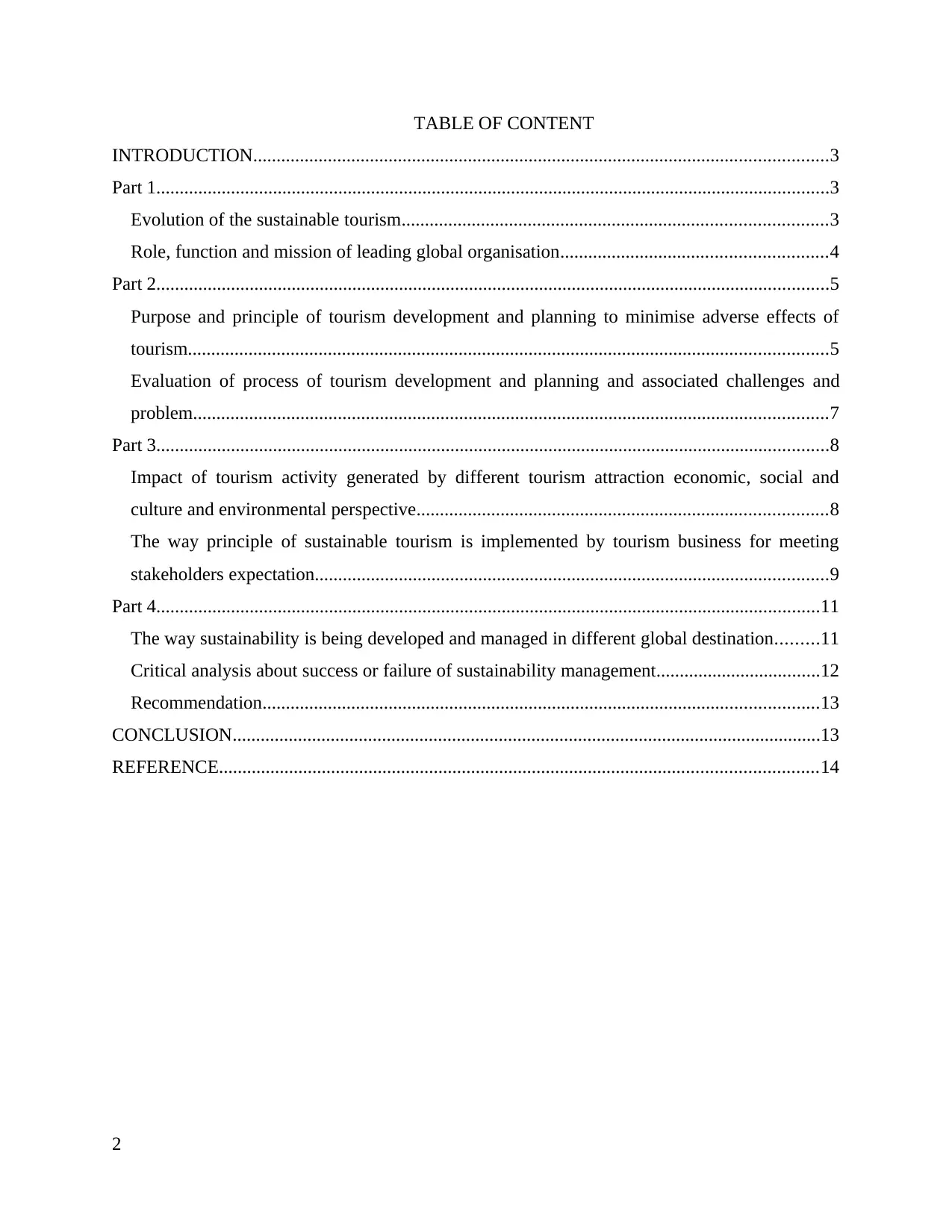
TABLE OF CONTENT
INTRODUCTION...........................................................................................................................3
Part 1................................................................................................................................................3
Evolution of the sustainable tourism...........................................................................................3
Role, function and mission of leading global organisation.........................................................4
Part 2................................................................................................................................................5
Purpose and principle of tourism development and planning to minimise adverse effects of
tourism.........................................................................................................................................5
Evaluation of process of tourism development and planning and associated challenges and
problem........................................................................................................................................7
Part 3................................................................................................................................................8
Impact of tourism activity generated by different tourism attraction economic, social and
culture and environmental perspective........................................................................................8
The way principle of sustainable tourism is implemented by tourism business for meeting
stakeholders expectation..............................................................................................................9
Part 4..............................................................................................................................................11
The way sustainability is being developed and managed in different global destination.........11
Critical analysis about success or failure of sustainability management...................................12
Recommendation.......................................................................................................................13
CONCLUSION..............................................................................................................................13
REFERENCE................................................................................................................................14
2
INTRODUCTION...........................................................................................................................3
Part 1................................................................................................................................................3
Evolution of the sustainable tourism...........................................................................................3
Role, function and mission of leading global organisation.........................................................4
Part 2................................................................................................................................................5
Purpose and principle of tourism development and planning to minimise adverse effects of
tourism.........................................................................................................................................5
Evaluation of process of tourism development and planning and associated challenges and
problem........................................................................................................................................7
Part 3................................................................................................................................................8
Impact of tourism activity generated by different tourism attraction economic, social and
culture and environmental perspective........................................................................................8
The way principle of sustainable tourism is implemented by tourism business for meeting
stakeholders expectation..............................................................................................................9
Part 4..............................................................................................................................................11
The way sustainability is being developed and managed in different global destination.........11
Critical analysis about success or failure of sustainability management...................................12
Recommendation.......................................................................................................................13
CONCLUSION..............................................................................................................................13
REFERENCE................................................................................................................................14
2
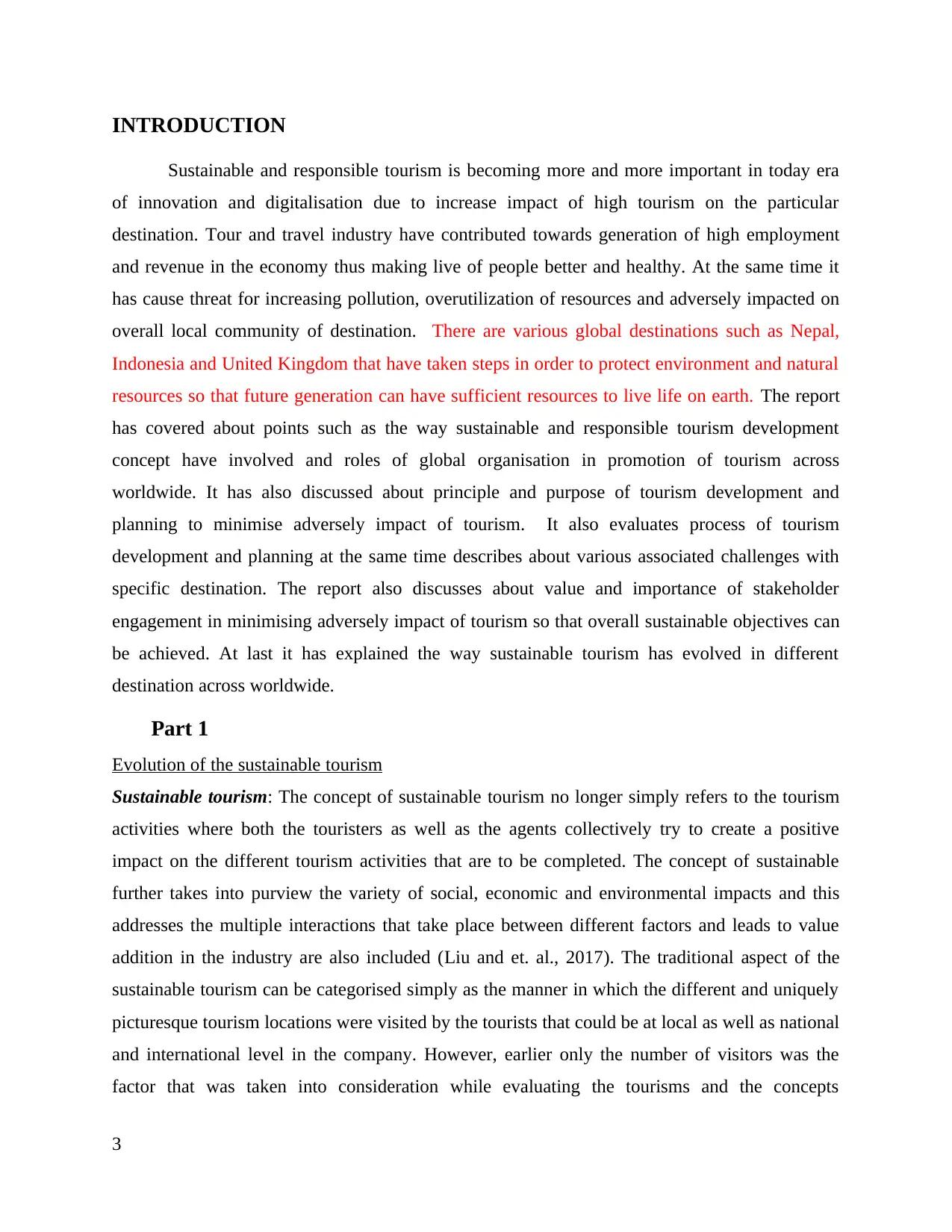
INTRODUCTION
Sustainable and responsible tourism is becoming more and more important in today era
of innovation and digitalisation due to increase impact of high tourism on the particular
destination. Tour and travel industry have contributed towards generation of high employment
and revenue in the economy thus making live of people better and healthy. At the same time it
has cause threat for increasing pollution, overutilization of resources and adversely impacted on
overall local community of destination. There are various global destinations such as Nepal,
Indonesia and United Kingdom that have taken steps in order to protect environment and natural
resources so that future generation can have sufficient resources to live life on earth. The report
has covered about points such as the way sustainable and responsible tourism development
concept have involved and roles of global organisation in promotion of tourism across
worldwide. It has also discussed about principle and purpose of tourism development and
planning to minimise adversely impact of tourism. It also evaluates process of tourism
development and planning at the same time describes about various associated challenges with
specific destination. The report also discusses about value and importance of stakeholder
engagement in minimising adversely impact of tourism so that overall sustainable objectives can
be achieved. At last it has explained the way sustainable tourism has evolved in different
destination across worldwide.
Part 1
Evolution of the sustainable tourism
Sustainable tourism: The concept of sustainable tourism no longer simply refers to the tourism
activities where both the touristers as well as the agents collectively try to create a positive
impact on the different tourism activities that are to be completed. The concept of sustainable
further takes into purview the variety of social, economic and environmental impacts and this
addresses the multiple interactions that take place between different factors and leads to value
addition in the industry are also included (Liu and et. al., 2017). The traditional aspect of the
sustainable tourism can be categorised simply as the manner in which the different and uniquely
picturesque tourism locations were visited by the tourists that could be at local as well as national
and international level in the company. However, earlier only the number of visitors was the
factor that was taken into consideration while evaluating the tourisms and the concepts
3
Sustainable and responsible tourism is becoming more and more important in today era
of innovation and digitalisation due to increase impact of high tourism on the particular
destination. Tour and travel industry have contributed towards generation of high employment
and revenue in the economy thus making live of people better and healthy. At the same time it
has cause threat for increasing pollution, overutilization of resources and adversely impacted on
overall local community of destination. There are various global destinations such as Nepal,
Indonesia and United Kingdom that have taken steps in order to protect environment and natural
resources so that future generation can have sufficient resources to live life on earth. The report
has covered about points such as the way sustainable and responsible tourism development
concept have involved and roles of global organisation in promotion of tourism across
worldwide. It has also discussed about principle and purpose of tourism development and
planning to minimise adversely impact of tourism. It also evaluates process of tourism
development and planning at the same time describes about various associated challenges with
specific destination. The report also discusses about value and importance of stakeholder
engagement in minimising adversely impact of tourism so that overall sustainable objectives can
be achieved. At last it has explained the way sustainable tourism has evolved in different
destination across worldwide.
Part 1
Evolution of the sustainable tourism
Sustainable tourism: The concept of sustainable tourism no longer simply refers to the tourism
activities where both the touristers as well as the agents collectively try to create a positive
impact on the different tourism activities that are to be completed. The concept of sustainable
further takes into purview the variety of social, economic and environmental impacts and this
addresses the multiple interactions that take place between different factors and leads to value
addition in the industry are also included (Liu and et. al., 2017). The traditional aspect of the
sustainable tourism can be categorised simply as the manner in which the different and uniquely
picturesque tourism locations were visited by the tourists that could be at local as well as national
and international level in the company. However, earlier only the number of visitors was the
factor that was taken into consideration while evaluating the tourisms and the concepts
3
⊘ This is a preview!⊘
Do you want full access?
Subscribe today to unlock all pages.

Trusted by 1+ million students worldwide
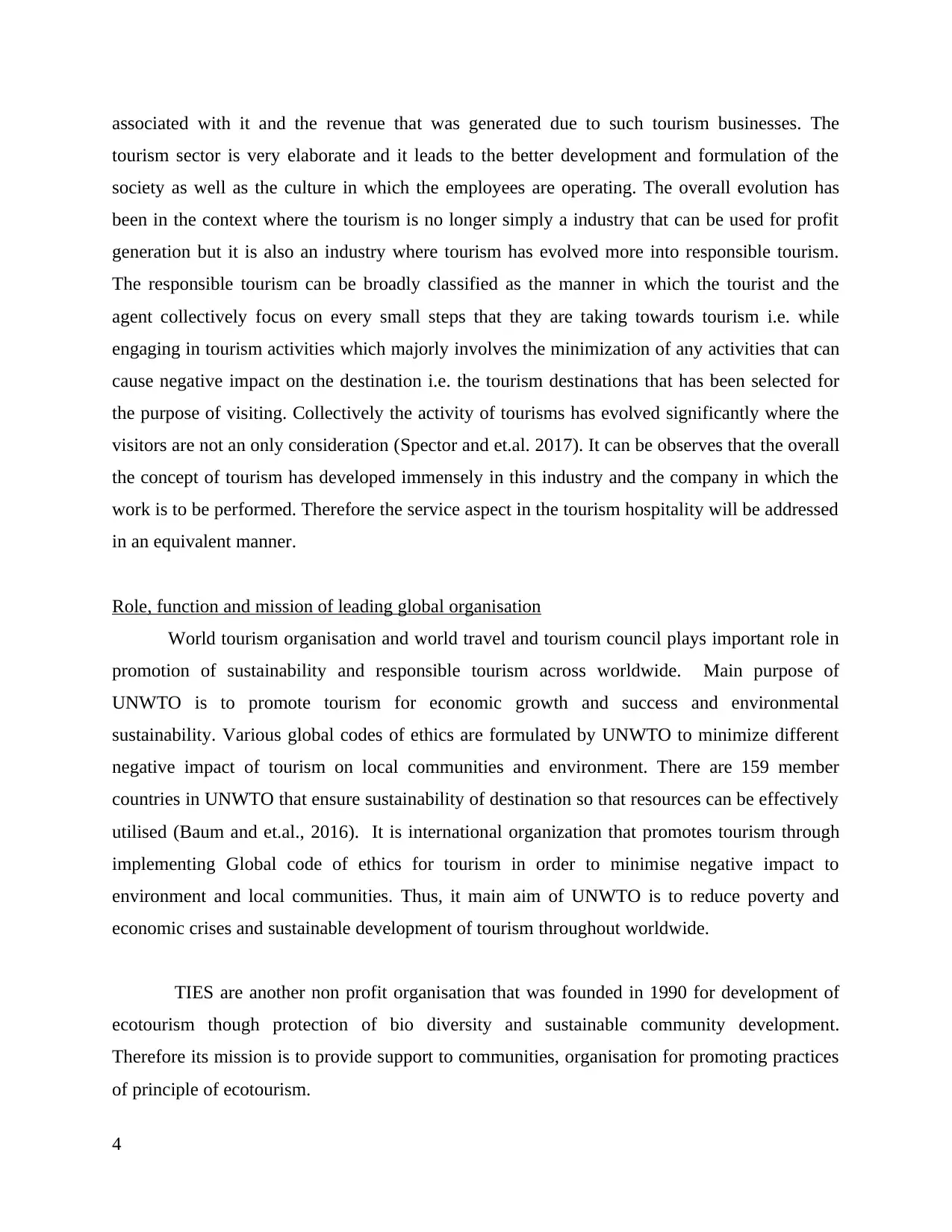
associated with it and the revenue that was generated due to such tourism businesses. The
tourism sector is very elaborate and it leads to the better development and formulation of the
society as well as the culture in which the employees are operating. The overall evolution has
been in the context where the tourism is no longer simply a industry that can be used for profit
generation but it is also an industry where tourism has evolved more into responsible tourism.
The responsible tourism can be broadly classified as the manner in which the tourist and the
agent collectively focus on every small steps that they are taking towards tourism i.e. while
engaging in tourism activities which majorly involves the minimization of any activities that can
cause negative impact on the destination i.e. the tourism destinations that has been selected for
the purpose of visiting. Collectively the activity of tourisms has evolved significantly where the
visitors are not an only consideration (Spector and et.al. 2017). It can be observes that the overall
the concept of tourism has developed immensely in this industry and the company in which the
work is to be performed. Therefore the service aspect in the tourism hospitality will be addressed
in an equivalent manner.
Role, function and mission of leading global organisation
World tourism organisation and world travel and tourism council plays important role in
promotion of sustainability and responsible tourism across worldwide. Main purpose of
UNWTO is to promote tourism for economic growth and success and environmental
sustainability. Various global codes of ethics are formulated by UNWTO to minimize different
negative impact of tourism on local communities and environment. There are 159 member
countries in UNWTO that ensure sustainability of destination so that resources can be effectively
utilised (Baum and et.al., 2016). It is international organization that promotes tourism through
implementing Global code of ethics for tourism in order to minimise negative impact to
environment and local communities. Thus, it main aim of UNWTO is to reduce poverty and
economic crises and sustainable development of tourism throughout worldwide.
TIES are another non profit organisation that was founded in 1990 for development of
ecotourism though protection of bio diversity and sustainable community development.
Therefore its mission is to provide support to communities, organisation for promoting practices
of principle of ecotourism.
4
tourism sector is very elaborate and it leads to the better development and formulation of the
society as well as the culture in which the employees are operating. The overall evolution has
been in the context where the tourism is no longer simply a industry that can be used for profit
generation but it is also an industry where tourism has evolved more into responsible tourism.
The responsible tourism can be broadly classified as the manner in which the tourist and the
agent collectively focus on every small steps that they are taking towards tourism i.e. while
engaging in tourism activities which majorly involves the minimization of any activities that can
cause negative impact on the destination i.e. the tourism destinations that has been selected for
the purpose of visiting. Collectively the activity of tourisms has evolved significantly where the
visitors are not an only consideration (Spector and et.al. 2017). It can be observes that the overall
the concept of tourism has developed immensely in this industry and the company in which the
work is to be performed. Therefore the service aspect in the tourism hospitality will be addressed
in an equivalent manner.
Role, function and mission of leading global organisation
World tourism organisation and world travel and tourism council plays important role in
promotion of sustainability and responsible tourism across worldwide. Main purpose of
UNWTO is to promote tourism for economic growth and success and environmental
sustainability. Various global codes of ethics are formulated by UNWTO to minimize different
negative impact of tourism on local communities and environment. There are 159 member
countries in UNWTO that ensure sustainability of destination so that resources can be effectively
utilised (Baum and et.al., 2016). It is international organization that promotes tourism through
implementing Global code of ethics for tourism in order to minimise negative impact to
environment and local communities. Thus, it main aim of UNWTO is to reduce poverty and
economic crises and sustainable development of tourism throughout worldwide.
TIES are another non profit organisation that was founded in 1990 for development of
ecotourism though protection of bio diversity and sustainable community development.
Therefore its mission is to provide support to communities, organisation for promoting practices
of principle of ecotourism.
4
Paraphrase This Document
Need a fresh take? Get an instant paraphrase of this document with our AI Paraphraser
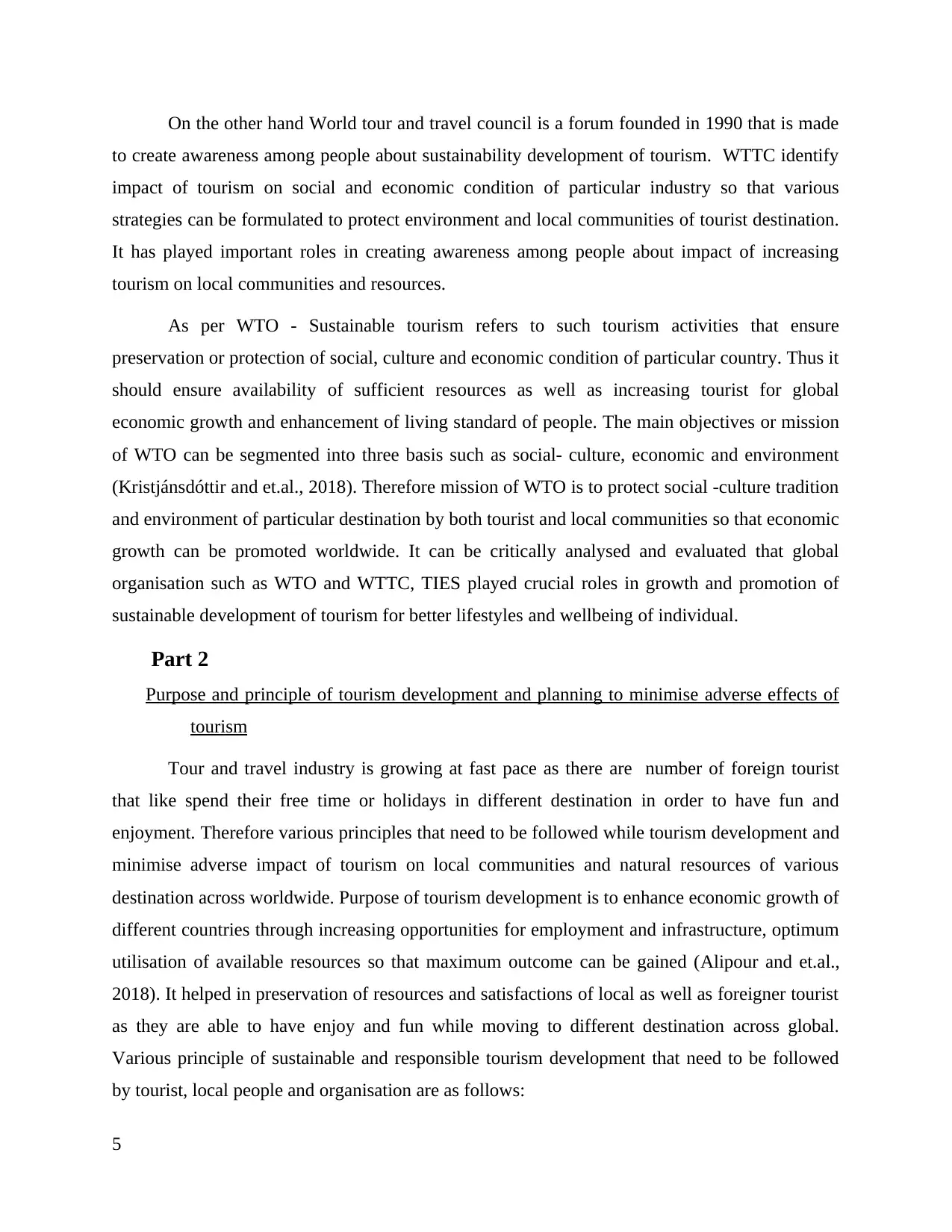
On the other hand World tour and travel council is a forum founded in 1990 that is made
to create awareness among people about sustainability development of tourism. WTTC identify
impact of tourism on social and economic condition of particular industry so that various
strategies can be formulated to protect environment and local communities of tourist destination.
It has played important roles in creating awareness among people about impact of increasing
tourism on local communities and resources.
As per WTO - Sustainable tourism refers to such tourism activities that ensure
preservation or protection of social, culture and economic condition of particular country. Thus it
should ensure availability of sufficient resources as well as increasing tourist for global
economic growth and enhancement of living standard of people. The main objectives or mission
of WTO can be segmented into three basis such as social- culture, economic and environment
(Kristjánsdóttir and et.al., 2018). Therefore mission of WTO is to protect social -culture tradition
and environment of particular destination by both tourist and local communities so that economic
growth can be promoted worldwide. It can be critically analysed and evaluated that global
organisation such as WTO and WTTC, TIES played crucial roles in growth and promotion of
sustainable development of tourism for better lifestyles and wellbeing of individual.
Part 2
Purpose and principle of tourism development and planning to minimise adverse effects of
tourism
Tour and travel industry is growing at fast pace as there are number of foreign tourist
that like spend their free time or holidays in different destination in order to have fun and
enjoyment. Therefore various principles that need to be followed while tourism development and
minimise adverse impact of tourism on local communities and natural resources of various
destination across worldwide. Purpose of tourism development is to enhance economic growth of
different countries through increasing opportunities for employment and infrastructure, optimum
utilisation of available resources so that maximum outcome can be gained (Alipour and et.al.,
2018). It helped in preservation of resources and satisfactions of local as well as foreigner tourist
as they are able to have enjoy and fun while moving to different destination across global.
Various principle of sustainable and responsible tourism development that need to be followed
by tourist, local people and organisation are as follows:
5
to create awareness among people about sustainability development of tourism. WTTC identify
impact of tourism on social and economic condition of particular industry so that various
strategies can be formulated to protect environment and local communities of tourist destination.
It has played important roles in creating awareness among people about impact of increasing
tourism on local communities and resources.
As per WTO - Sustainable tourism refers to such tourism activities that ensure
preservation or protection of social, culture and economic condition of particular country. Thus it
should ensure availability of sufficient resources as well as increasing tourist for global
economic growth and enhancement of living standard of people. The main objectives or mission
of WTO can be segmented into three basis such as social- culture, economic and environment
(Kristjánsdóttir and et.al., 2018). Therefore mission of WTO is to protect social -culture tradition
and environment of particular destination by both tourist and local communities so that economic
growth can be promoted worldwide. It can be critically analysed and evaluated that global
organisation such as WTO and WTTC, TIES played crucial roles in growth and promotion of
sustainable development of tourism for better lifestyles and wellbeing of individual.
Part 2
Purpose and principle of tourism development and planning to minimise adverse effects of
tourism
Tour and travel industry is growing at fast pace as there are number of foreign tourist
that like spend their free time or holidays in different destination in order to have fun and
enjoyment. Therefore various principles that need to be followed while tourism development and
minimise adverse impact of tourism on local communities and natural resources of various
destination across worldwide. Purpose of tourism development is to enhance economic growth of
different countries through increasing opportunities for employment and infrastructure, optimum
utilisation of available resources so that maximum outcome can be gained (Alipour and et.al.,
2018). It helped in preservation of resources and satisfactions of local as well as foreigner tourist
as they are able to have enjoy and fun while moving to different destination across global.
Various principle of sustainable and responsible tourism development that need to be followed
by tourist, local people and organisation are as follows:
5
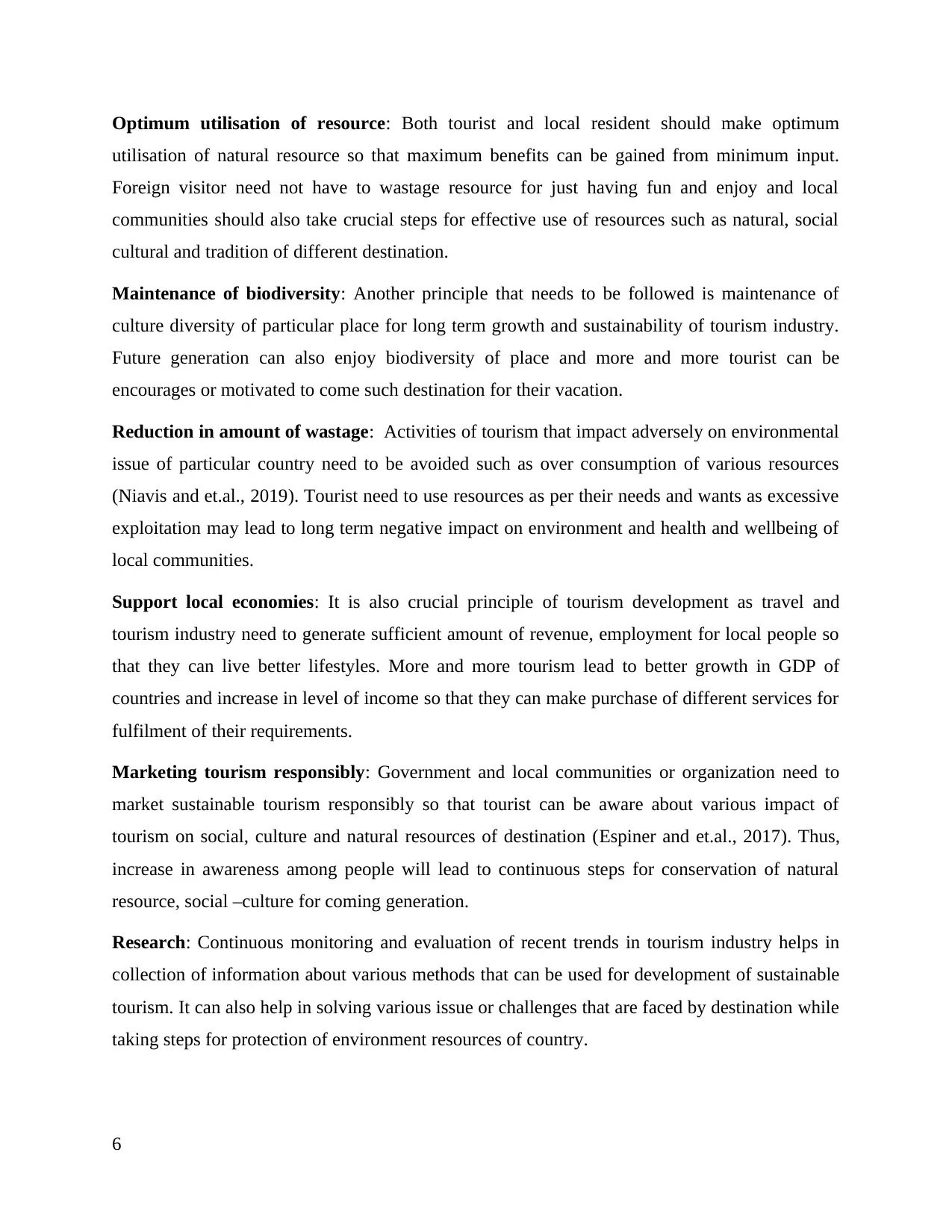
Optimum utilisation of resource: Both tourist and local resident should make optimum
utilisation of natural resource so that maximum benefits can be gained from minimum input.
Foreign visitor need not have to wastage resource for just having fun and enjoy and local
communities should also take crucial steps for effective use of resources such as natural, social
cultural and tradition of different destination.
Maintenance of biodiversity: Another principle that needs to be followed is maintenance of
culture diversity of particular place for long term growth and sustainability of tourism industry.
Future generation can also enjoy biodiversity of place and more and more tourist can be
encourages or motivated to come such destination for their vacation.
Reduction in amount of wastage: Activities of tourism that impact adversely on environmental
issue of particular country need to be avoided such as over consumption of various resources
(Niavis and et.al., 2019). Tourist need to use resources as per their needs and wants as excessive
exploitation may lead to long term negative impact on environment and health and wellbeing of
local communities.
Support local economies: It is also crucial principle of tourism development as travel and
tourism industry need to generate sufficient amount of revenue, employment for local people so
that they can live better lifestyles. More and more tourism lead to better growth in GDP of
countries and increase in level of income so that they can make purchase of different services for
fulfilment of their requirements.
Marketing tourism responsibly: Government and local communities or organization need to
market sustainable tourism responsibly so that tourist can be aware about various impact of
tourism on social, culture and natural resources of destination (Espiner and et.al., 2017). Thus,
increase in awareness among people will lead to continuous steps for conservation of natural
resource, social –culture for coming generation.
Research: Continuous monitoring and evaluation of recent trends in tourism industry helps in
collection of information about various methods that can be used for development of sustainable
tourism. It can also help in solving various issue or challenges that are faced by destination while
taking steps for protection of environment resources of country.
6
utilisation of natural resource so that maximum benefits can be gained from minimum input.
Foreign visitor need not have to wastage resource for just having fun and enjoy and local
communities should also take crucial steps for effective use of resources such as natural, social
cultural and tradition of different destination.
Maintenance of biodiversity: Another principle that needs to be followed is maintenance of
culture diversity of particular place for long term growth and sustainability of tourism industry.
Future generation can also enjoy biodiversity of place and more and more tourist can be
encourages or motivated to come such destination for their vacation.
Reduction in amount of wastage: Activities of tourism that impact adversely on environmental
issue of particular country need to be avoided such as over consumption of various resources
(Niavis and et.al., 2019). Tourist need to use resources as per their needs and wants as excessive
exploitation may lead to long term negative impact on environment and health and wellbeing of
local communities.
Support local economies: It is also crucial principle of tourism development as travel and
tourism industry need to generate sufficient amount of revenue, employment for local people so
that they can live better lifestyles. More and more tourism lead to better growth in GDP of
countries and increase in level of income so that they can make purchase of different services for
fulfilment of their requirements.
Marketing tourism responsibly: Government and local communities or organization need to
market sustainable tourism responsibly so that tourist can be aware about various impact of
tourism on social, culture and natural resources of destination (Espiner and et.al., 2017). Thus,
increase in awareness among people will lead to continuous steps for conservation of natural
resource, social –culture for coming generation.
Research: Continuous monitoring and evaluation of recent trends in tourism industry helps in
collection of information about various methods that can be used for development of sustainable
tourism. It can also help in solving various issue or challenges that are faced by destination while
taking steps for protection of environment resources of country.
6
⊘ This is a preview!⊘
Do you want full access?
Subscribe today to unlock all pages.

Trusted by 1+ million students worldwide
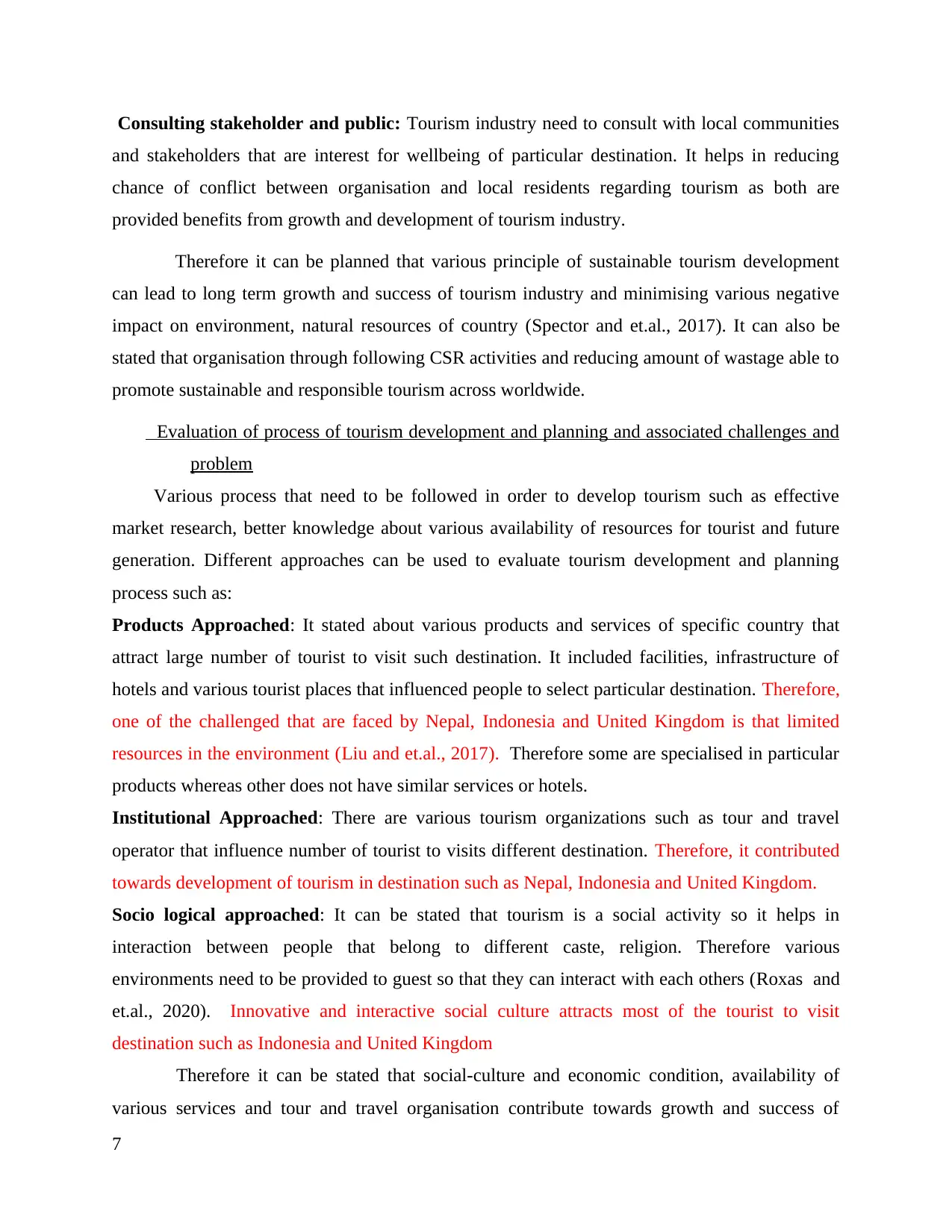
Consulting stakeholder and public: Tourism industry need to consult with local communities
and stakeholders that are interest for wellbeing of particular destination. It helps in reducing
chance of conflict between organisation and local residents regarding tourism as both are
provided benefits from growth and development of tourism industry.
Therefore it can be planned that various principle of sustainable tourism development
can lead to long term growth and success of tourism industry and minimising various negative
impact on environment, natural resources of country (Spector and et.al., 2017). It can also be
stated that organisation through following CSR activities and reducing amount of wastage able to
promote sustainable and responsible tourism across worldwide.
Evaluation of process of tourism development and planning and associated challenges and
problem
Various process that need to be followed in order to develop tourism such as effective
market research, better knowledge about various availability of resources for tourist and future
generation. Different approaches can be used to evaluate tourism development and planning
process such as:
Products Approached: It stated about various products and services of specific country that
attract large number of tourist to visit such destination. It included facilities, infrastructure of
hotels and various tourist places that influenced people to select particular destination. Therefore,
one of the challenged that are faced by Nepal, Indonesia and United Kingdom is that limited
resources in the environment (Liu and et.al., 2017). Therefore some are specialised in particular
products whereas other does not have similar services or hotels.
Institutional Approached: There are various tourism organizations such as tour and travel
operator that influence number of tourist to visits different destination. Therefore, it contributed
towards development of tourism in destination such as Nepal, Indonesia and United Kingdom.
Socio logical approached: It can be stated that tourism is a social activity so it helps in
interaction between people that belong to different caste, religion. Therefore various
environments need to be provided to guest so that they can interact with each others (Roxas and
et.al., 2020). Innovative and interactive social culture attracts most of the tourist to visit
destination such as Indonesia and United Kingdom
Therefore it can be stated that social-culture and economic condition, availability of
various services and tour and travel organisation contribute towards growth and success of
7
and stakeholders that are interest for wellbeing of particular destination. It helps in reducing
chance of conflict between organisation and local residents regarding tourism as both are
provided benefits from growth and development of tourism industry.
Therefore it can be planned that various principle of sustainable tourism development
can lead to long term growth and success of tourism industry and minimising various negative
impact on environment, natural resources of country (Spector and et.al., 2017). It can also be
stated that organisation through following CSR activities and reducing amount of wastage able to
promote sustainable and responsible tourism across worldwide.
Evaluation of process of tourism development and planning and associated challenges and
problem
Various process that need to be followed in order to develop tourism such as effective
market research, better knowledge about various availability of resources for tourist and future
generation. Different approaches can be used to evaluate tourism development and planning
process such as:
Products Approached: It stated about various products and services of specific country that
attract large number of tourist to visit such destination. It included facilities, infrastructure of
hotels and various tourist places that influenced people to select particular destination. Therefore,
one of the challenged that are faced by Nepal, Indonesia and United Kingdom is that limited
resources in the environment (Liu and et.al., 2017). Therefore some are specialised in particular
products whereas other does not have similar services or hotels.
Institutional Approached: There are various tourism organizations such as tour and travel
operator that influence number of tourist to visits different destination. Therefore, it contributed
towards development of tourism in destination such as Nepal, Indonesia and United Kingdom.
Socio logical approached: It can be stated that tourism is a social activity so it helps in
interaction between people that belong to different caste, religion. Therefore various
environments need to be provided to guest so that they can interact with each others (Roxas and
et.al., 2020). Innovative and interactive social culture attracts most of the tourist to visit
destination such as Indonesia and United Kingdom
Therefore it can be stated that social-culture and economic condition, availability of
various services and tour and travel organisation contribute towards growth and success of
7
Paraphrase This Document
Need a fresh take? Get an instant paraphrase of this document with our AI Paraphraser
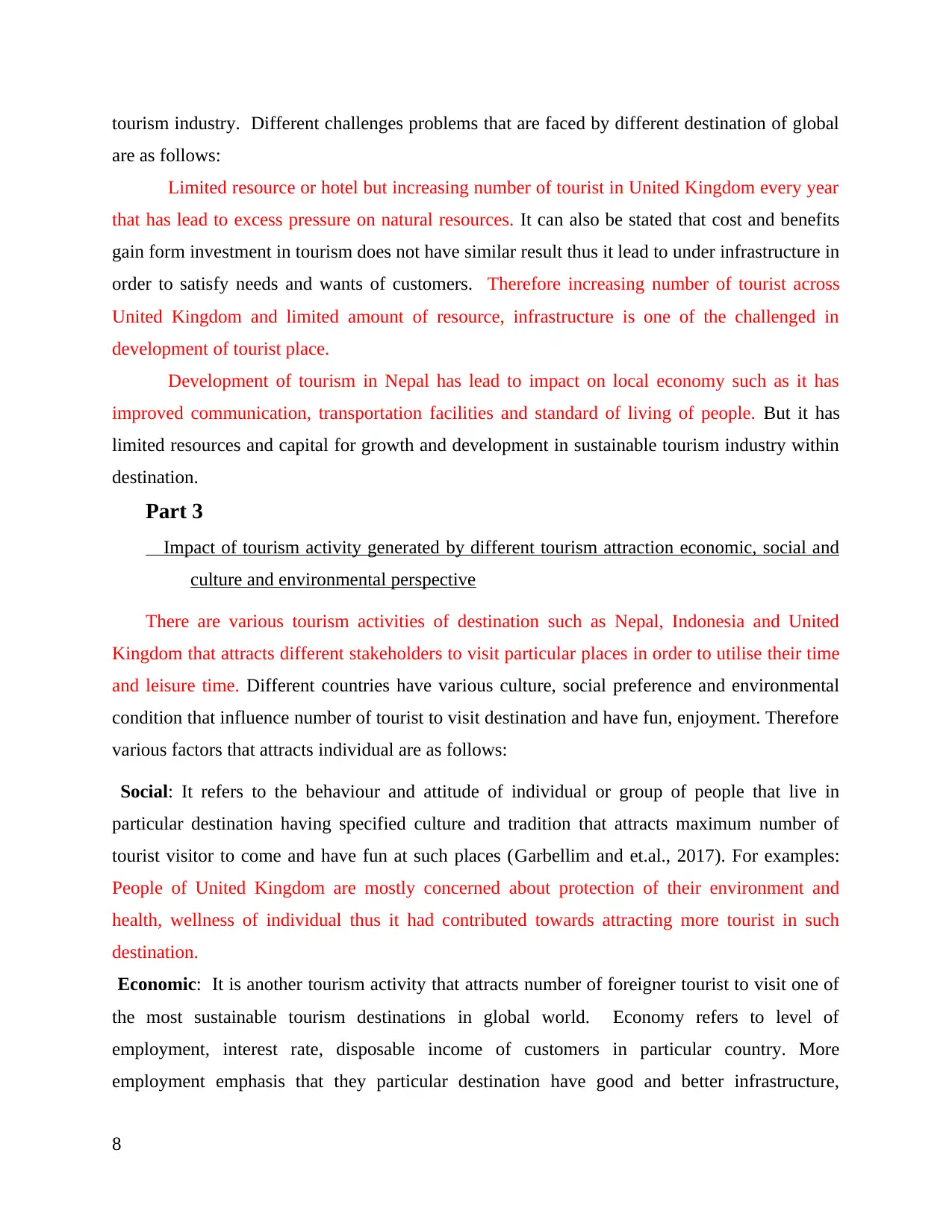
tourism industry. Different challenges problems that are faced by different destination of global
are as follows:
Limited resource or hotel but increasing number of tourist in United Kingdom every year
that has lead to excess pressure on natural resources. It can also be stated that cost and benefits
gain form investment in tourism does not have similar result thus it lead to under infrastructure in
order to satisfy needs and wants of customers. Therefore increasing number of tourist across
United Kingdom and limited amount of resource, infrastructure is one of the challenged in
development of tourist place.
Development of tourism in Nepal has lead to impact on local economy such as it has
improved communication, transportation facilities and standard of living of people. But it has
limited resources and capital for growth and development in sustainable tourism industry within
destination.
Part 3
Impact of tourism activity generated by different tourism attraction economic, social and
culture and environmental perspective
There are various tourism activities of destination such as Nepal, Indonesia and United
Kingdom that attracts different stakeholders to visit particular places in order to utilise their time
and leisure time. Different countries have various culture, social preference and environmental
condition that influence number of tourist to visit destination and have fun, enjoyment. Therefore
various factors that attracts individual are as follows:
Social: It refers to the behaviour and attitude of individual or group of people that live in
particular destination having specified culture and tradition that attracts maximum number of
tourist visitor to come and have fun at such places (Garbellim and et.al., 2017). For examples:
People of United Kingdom are mostly concerned about protection of their environment and
health, wellness of individual thus it had contributed towards attracting more tourist in such
destination.
Economic: It is another tourism activity that attracts number of foreigner tourist to visit one of
the most sustainable tourism destinations in global world. Economy refers to level of
employment, interest rate, disposable income of customers in particular country. More
employment emphasis that they particular destination have good and better infrastructure,
8
are as follows:
Limited resource or hotel but increasing number of tourist in United Kingdom every year
that has lead to excess pressure on natural resources. It can also be stated that cost and benefits
gain form investment in tourism does not have similar result thus it lead to under infrastructure in
order to satisfy needs and wants of customers. Therefore increasing number of tourist across
United Kingdom and limited amount of resource, infrastructure is one of the challenged in
development of tourist place.
Development of tourism in Nepal has lead to impact on local economy such as it has
improved communication, transportation facilities and standard of living of people. But it has
limited resources and capital for growth and development in sustainable tourism industry within
destination.
Part 3
Impact of tourism activity generated by different tourism attraction economic, social and
culture and environmental perspective
There are various tourism activities of destination such as Nepal, Indonesia and United
Kingdom that attracts different stakeholders to visit particular places in order to utilise their time
and leisure time. Different countries have various culture, social preference and environmental
condition that influence number of tourist to visit destination and have fun, enjoyment. Therefore
various factors that attracts individual are as follows:
Social: It refers to the behaviour and attitude of individual or group of people that live in
particular destination having specified culture and tradition that attracts maximum number of
tourist visitor to come and have fun at such places (Garbellim and et.al., 2017). For examples:
People of United Kingdom are mostly concerned about protection of their environment and
health, wellness of individual thus it had contributed towards attracting more tourist in such
destination.
Economic: It is another tourism activity that attracts number of foreigner tourist to visit one of
the most sustainable tourism destinations in global world. Economy refers to level of
employment, interest rate, disposable income of customers in particular country. More
employment emphasis that they particular destination have good and better infrastructure,
8
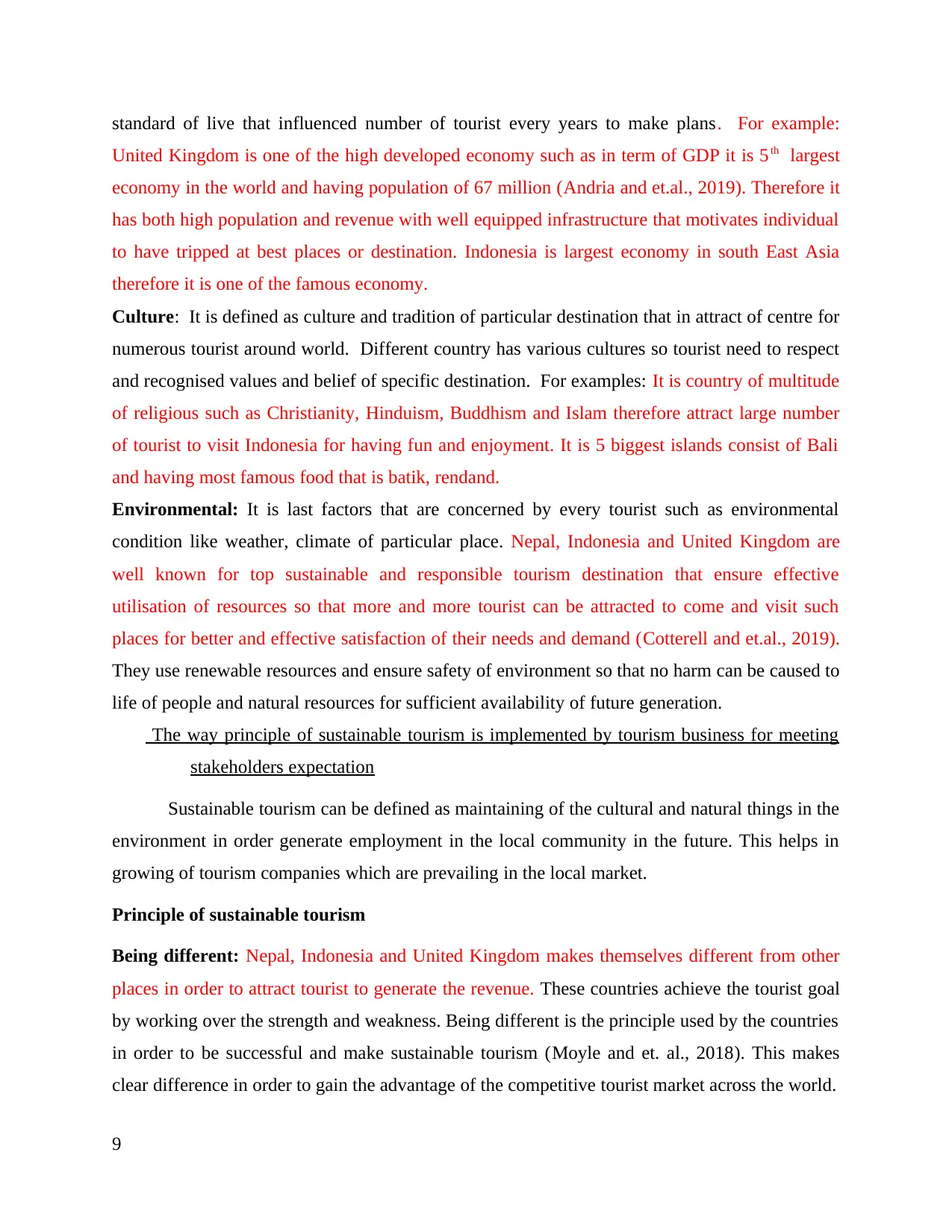
standard of live that influenced number of tourist every years to make plans. For example:
United Kingdom is one of the high developed economy such as in term of GDP it is 5th largest
economy in the world and having population of 67 million (Andria and et.al., 2019). Therefore it
has both high population and revenue with well equipped infrastructure that motivates individual
to have tripped at best places or destination. Indonesia is largest economy in south East Asia
therefore it is one of the famous economy.
Culture: It is defined as culture and tradition of particular destination that in attract of centre for
numerous tourist around world. Different country has various cultures so tourist need to respect
and recognised values and belief of specific destination. For examples: It is country of multitude
of religious such as Christianity, Hinduism, Buddhism and Islam therefore attract large number
of tourist to visit Indonesia for having fun and enjoyment. It is 5 biggest islands consist of Bali
and having most famous food that is batik, rendand.
Environmental: It is last factors that are concerned by every tourist such as environmental
condition like weather, climate of particular place. Nepal, Indonesia and United Kingdom are
well known for top sustainable and responsible tourism destination that ensure effective
utilisation of resources so that more and more tourist can be attracted to come and visit such
places for better and effective satisfaction of their needs and demand (Cotterell and et.al., 2019).
They use renewable resources and ensure safety of environment so that no harm can be caused to
life of people and natural resources for sufficient availability of future generation.
The way principle of sustainable tourism is implemented by tourism business for meeting
stakeholders expectation
Sustainable tourism can be defined as maintaining of the cultural and natural things in the
environment in order generate employment in the local community in the future. This helps in
growing of tourism companies which are prevailing in the local market.
Principle of sustainable tourism
Being different: Nepal, Indonesia and United Kingdom makes themselves different from other
places in order to attract tourist to generate the revenue. These countries achieve the tourist goal
by working over the strength and weakness. Being different is the principle used by the countries
in order to be successful and make sustainable tourism (Moyle and et. al., 2018). This makes
clear difference in order to gain the advantage of the competitive tourist market across the world.
9
United Kingdom is one of the high developed economy such as in term of GDP it is 5th largest
economy in the world and having population of 67 million (Andria and et.al., 2019). Therefore it
has both high population and revenue with well equipped infrastructure that motivates individual
to have tripped at best places or destination. Indonesia is largest economy in south East Asia
therefore it is one of the famous economy.
Culture: It is defined as culture and tradition of particular destination that in attract of centre for
numerous tourist around world. Different country has various cultures so tourist need to respect
and recognised values and belief of specific destination. For examples: It is country of multitude
of religious such as Christianity, Hinduism, Buddhism and Islam therefore attract large number
of tourist to visit Indonesia for having fun and enjoyment. It is 5 biggest islands consist of Bali
and having most famous food that is batik, rendand.
Environmental: It is last factors that are concerned by every tourist such as environmental
condition like weather, climate of particular place. Nepal, Indonesia and United Kingdom are
well known for top sustainable and responsible tourism destination that ensure effective
utilisation of resources so that more and more tourist can be attracted to come and visit such
places for better and effective satisfaction of their needs and demand (Cotterell and et.al., 2019).
They use renewable resources and ensure safety of environment so that no harm can be caused to
life of people and natural resources for sufficient availability of future generation.
The way principle of sustainable tourism is implemented by tourism business for meeting
stakeholders expectation
Sustainable tourism can be defined as maintaining of the cultural and natural things in the
environment in order generate employment in the local community in the future. This helps in
growing of tourism companies which are prevailing in the local market.
Principle of sustainable tourism
Being different: Nepal, Indonesia and United Kingdom makes themselves different from other
places in order to attract tourist to generate the revenue. These countries achieve the tourist goal
by working over the strength and weakness. Being different is the principle used by the countries
in order to be successful and make sustainable tourism (Moyle and et. al., 2018). This makes
clear difference in order to gain the advantage of the competitive tourist market across the world.
9
⊘ This is a preview!⊘
Do you want full access?
Subscribe today to unlock all pages.

Trusted by 1+ million students worldwide
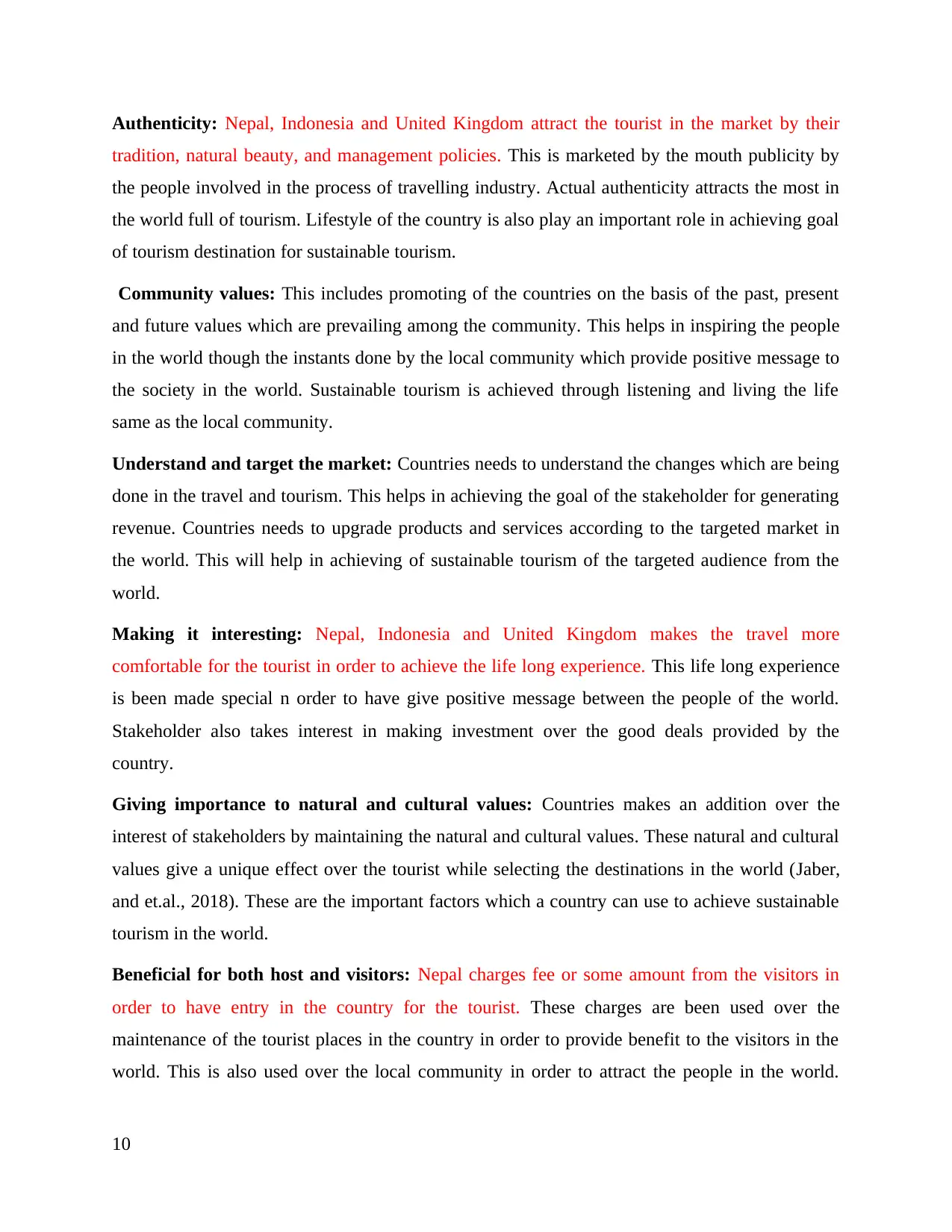
Authenticity: Nepal, Indonesia and United Kingdom attract the tourist in the market by their
tradition, natural beauty, and management policies. This is marketed by the mouth publicity by
the people involved in the process of travelling industry. Actual authenticity attracts the most in
the world full of tourism. Lifestyle of the country is also play an important role in achieving goal
of tourism destination for sustainable tourism.
Community values: This includes promoting of the countries on the basis of the past, present
and future values which are prevailing among the community. This helps in inspiring the people
in the world though the instants done by the local community which provide positive message to
the society in the world. Sustainable tourism is achieved through listening and living the life
same as the local community.
Understand and target the market: Countries needs to understand the changes which are being
done in the travel and tourism. This helps in achieving the goal of the stakeholder for generating
revenue. Countries needs to upgrade products and services according to the targeted market in
the world. This will help in achieving of sustainable tourism of the targeted audience from the
world.
Making it interesting: Nepal, Indonesia and United Kingdom makes the travel more
comfortable for the tourist in order to achieve the life long experience. This life long experience
is been made special n order to have give positive message between the people of the world.
Stakeholder also takes interest in making investment over the good deals provided by the
country.
Giving importance to natural and cultural values: Countries makes an addition over the
interest of stakeholders by maintaining the natural and cultural values. These natural and cultural
values give a unique effect over the tourist while selecting the destinations in the world (Jaber,
and et.al., 2018). These are the important factors which a country can use to achieve sustainable
tourism in the world.
Beneficial for both host and visitors: Nepal charges fee or some amount from the visitors in
order to have entry in the country for the tourist. These charges are been used over the
maintenance of the tourist places in the country in order to provide benefit to the visitors in the
world. This is also used over the local community in order to attract the people in the world.
10
tradition, natural beauty, and management policies. This is marketed by the mouth publicity by
the people involved in the process of travelling industry. Actual authenticity attracts the most in
the world full of tourism. Lifestyle of the country is also play an important role in achieving goal
of tourism destination for sustainable tourism.
Community values: This includes promoting of the countries on the basis of the past, present
and future values which are prevailing among the community. This helps in inspiring the people
in the world though the instants done by the local community which provide positive message to
the society in the world. Sustainable tourism is achieved through listening and living the life
same as the local community.
Understand and target the market: Countries needs to understand the changes which are being
done in the travel and tourism. This helps in achieving the goal of the stakeholder for generating
revenue. Countries needs to upgrade products and services according to the targeted market in
the world. This will help in achieving of sustainable tourism of the targeted audience from the
world.
Making it interesting: Nepal, Indonesia and United Kingdom makes the travel more
comfortable for the tourist in order to achieve the life long experience. This life long experience
is been made special n order to have give positive message between the people of the world.
Stakeholder also takes interest in making investment over the good deals provided by the
country.
Giving importance to natural and cultural values: Countries makes an addition over the
interest of stakeholders by maintaining the natural and cultural values. These natural and cultural
values give a unique effect over the tourist while selecting the destinations in the world (Jaber,
and et.al., 2018). These are the important factors which a country can use to achieve sustainable
tourism in the world.
Beneficial for both host and visitors: Nepal charges fee or some amount from the visitors in
order to have entry in the country for the tourist. These charges are been used over the
maintenance of the tourist places in the country in order to provide benefit to the visitors in the
world. This is also used over the local community in order to attract the people in the world.
10
Paraphrase This Document
Need a fresh take? Get an instant paraphrase of this document with our AI Paraphraser
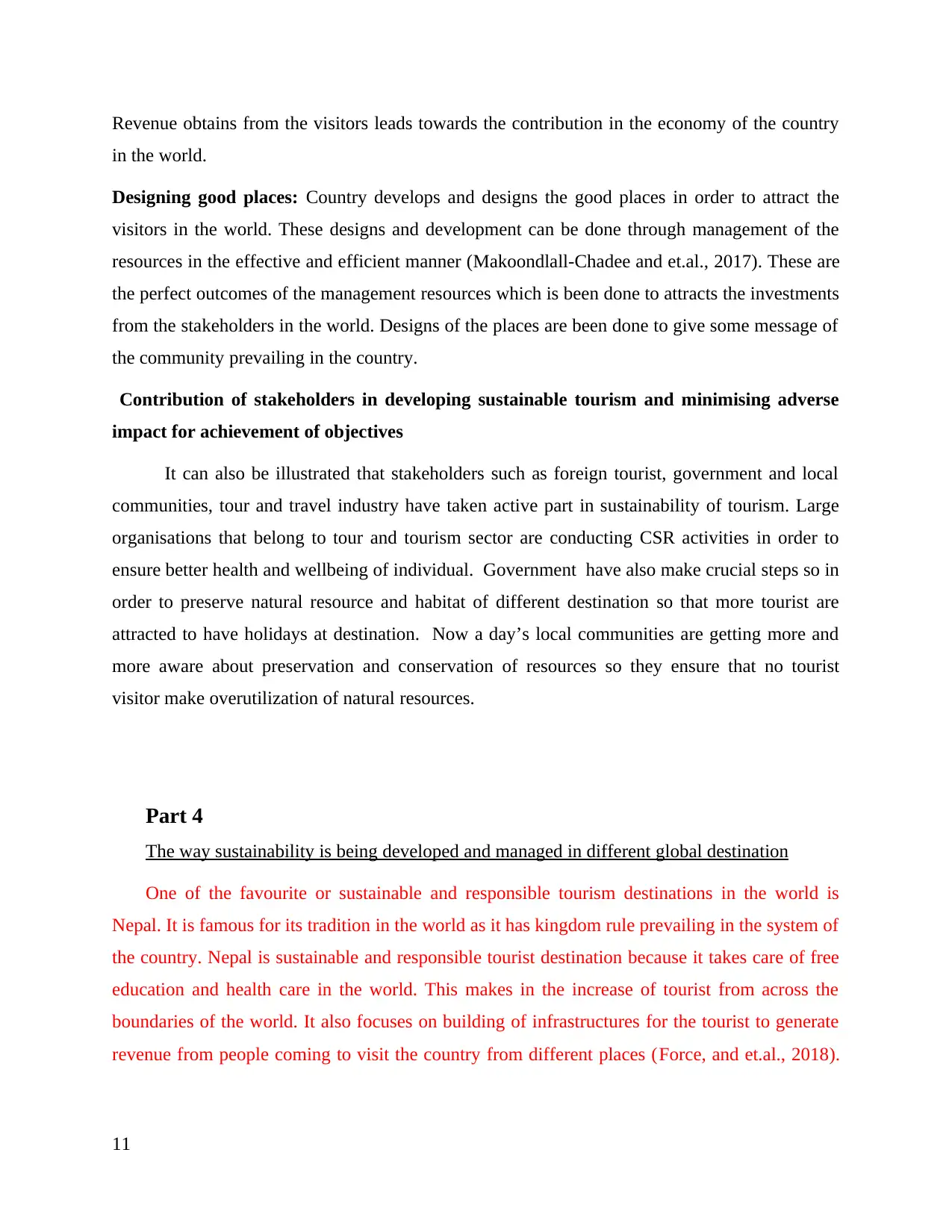
Revenue obtains from the visitors leads towards the contribution in the economy of the country
in the world.
Designing good places: Country develops and designs the good places in order to attract the
visitors in the world. These designs and development can be done through management of the
resources in the effective and efficient manner (Makoondlall-Chadee and et.al., 2017). These are
the perfect outcomes of the management resources which is been done to attracts the investments
from the stakeholders in the world. Designs of the places are been done to give some message of
the community prevailing in the country.
Contribution of stakeholders in developing sustainable tourism and minimising adverse
impact for achievement of objectives
It can also be illustrated that stakeholders such as foreign tourist, government and local
communities, tour and travel industry have taken active part in sustainability of tourism. Large
organisations that belong to tour and tourism sector are conducting CSR activities in order to
ensure better health and wellbeing of individual. Government have also make crucial steps so in
order to preserve natural resource and habitat of different destination so that more tourist are
attracted to have holidays at destination. Now a day’s local communities are getting more and
more aware about preservation and conservation of resources so they ensure that no tourist
visitor make overutilization of natural resources.
Part 4
The way sustainability is being developed and managed in different global destination
One of the favourite or sustainable and responsible tourism destinations in the world is
Nepal. It is famous for its tradition in the world as it has kingdom rule prevailing in the system of
the country. Nepal is sustainable and responsible tourist destination because it takes care of free
education and health care in the world. This makes in the increase of tourist from across the
boundaries of the world. It also focuses on building of infrastructures for the tourist to generate
revenue from people coming to visit the country from different places (Force, and et.al., 2018).
11
in the world.
Designing good places: Country develops and designs the good places in order to attract the
visitors in the world. These designs and development can be done through management of the
resources in the effective and efficient manner (Makoondlall-Chadee and et.al., 2017). These are
the perfect outcomes of the management resources which is been done to attracts the investments
from the stakeholders in the world. Designs of the places are been done to give some message of
the community prevailing in the country.
Contribution of stakeholders in developing sustainable tourism and minimising adverse
impact for achievement of objectives
It can also be illustrated that stakeholders such as foreign tourist, government and local
communities, tour and travel industry have taken active part in sustainability of tourism. Large
organisations that belong to tour and tourism sector are conducting CSR activities in order to
ensure better health and wellbeing of individual. Government have also make crucial steps so in
order to preserve natural resource and habitat of different destination so that more tourist are
attracted to have holidays at destination. Now a day’s local communities are getting more and
more aware about preservation and conservation of resources so they ensure that no tourist
visitor make overutilization of natural resources.
Part 4
The way sustainability is being developed and managed in different global destination
One of the favourite or sustainable and responsible tourism destinations in the world is
Nepal. It is famous for its tradition in the world as it has kingdom rule prevailing in the system of
the country. Nepal is sustainable and responsible tourist destination because it takes care of free
education and health care in the world. This makes in the increase of tourist from across the
boundaries of the world. It also focuses on building of infrastructures for the tourist to generate
revenue from people coming to visit the country from different places (Force, and et.al., 2018).
11
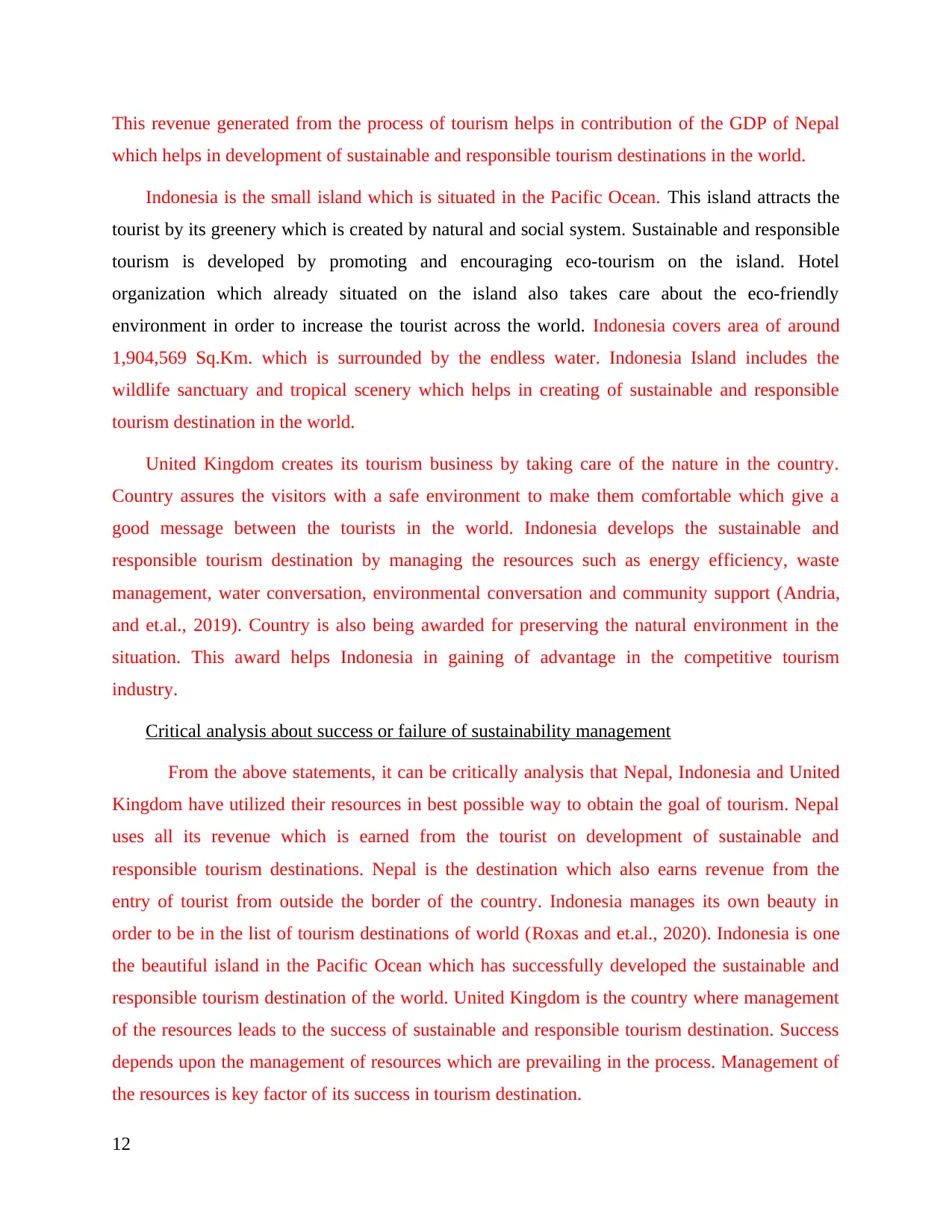
This revenue generated from the process of tourism helps in contribution of the GDP of Nepal
which helps in development of sustainable and responsible tourism destinations in the world.
Indonesia is the small island which is situated in the Pacific Ocean. This island attracts the
tourist by its greenery which is created by natural and social system. Sustainable and responsible
tourism is developed by promoting and encouraging eco-tourism on the island. Hotel
organization which already situated on the island also takes care about the eco-friendly
environment in order to increase the tourist across the world. Indonesia covers area of around
1,904,569 Sq.Km. which is surrounded by the endless water. Indonesia Island includes the
wildlife sanctuary and tropical scenery which helps in creating of sustainable and responsible
tourism destination in the world.
United Kingdom creates its tourism business by taking care of the nature in the country.
Country assures the visitors with a safe environment to make them comfortable which give a
good message between the tourists in the world. Indonesia develops the sustainable and
responsible tourism destination by managing the resources such as energy efficiency, waste
management, water conversation, environmental conversation and community support (Andria,
and et.al., 2019). Country is also being awarded for preserving the natural environment in the
situation. This award helps Indonesia in gaining of advantage in the competitive tourism
industry.
Critical analysis about success or failure of sustainability management
From the above statements, it can be critically analysis that Nepal, Indonesia and United
Kingdom have utilized their resources in best possible way to obtain the goal of tourism. Nepal
uses all its revenue which is earned from the tourist on development of sustainable and
responsible tourism destinations. Nepal is the destination which also earns revenue from the
entry of tourist from outside the border of the country. Indonesia manages its own beauty in
order to be in the list of tourism destinations of world (Roxas and et.al., 2020). Indonesia is one
the beautiful island in the Pacific Ocean which has successfully developed the sustainable and
responsible tourism destination of the world. United Kingdom is the country where management
of the resources leads to the success of sustainable and responsible tourism destination. Success
depends upon the management of resources which are prevailing in the process. Management of
the resources is key factor of its success in tourism destination.
12
which helps in development of sustainable and responsible tourism destinations in the world.
Indonesia is the small island which is situated in the Pacific Ocean. This island attracts the
tourist by its greenery which is created by natural and social system. Sustainable and responsible
tourism is developed by promoting and encouraging eco-tourism on the island. Hotel
organization which already situated on the island also takes care about the eco-friendly
environment in order to increase the tourist across the world. Indonesia covers area of around
1,904,569 Sq.Km. which is surrounded by the endless water. Indonesia Island includes the
wildlife sanctuary and tropical scenery which helps in creating of sustainable and responsible
tourism destination in the world.
United Kingdom creates its tourism business by taking care of the nature in the country.
Country assures the visitors with a safe environment to make them comfortable which give a
good message between the tourists in the world. Indonesia develops the sustainable and
responsible tourism destination by managing the resources such as energy efficiency, waste
management, water conversation, environmental conversation and community support (Andria,
and et.al., 2019). Country is also being awarded for preserving the natural environment in the
situation. This award helps Indonesia in gaining of advantage in the competitive tourism
industry.
Critical analysis about success or failure of sustainability management
From the above statements, it can be critically analysis that Nepal, Indonesia and United
Kingdom have utilized their resources in best possible way to obtain the goal of tourism. Nepal
uses all its revenue which is earned from the tourist on development of sustainable and
responsible tourism destinations. Nepal is the destination which also earns revenue from the
entry of tourist from outside the border of the country. Indonesia manages its own beauty in
order to be in the list of tourism destinations of world (Roxas and et.al., 2020). Indonesia is one
the beautiful island in the Pacific Ocean which has successfully developed the sustainable and
responsible tourism destination of the world. United Kingdom is the country where management
of the resources leads to the success of sustainable and responsible tourism destination. Success
depends upon the management of resources which are prevailing in the process. Management of
the resources is key factor of its success in tourism destination.
12
⊘ This is a preview!⊘
Do you want full access?
Subscribe today to unlock all pages.

Trusted by 1+ million students worldwide
1 out of 14
Related Documents
Your All-in-One AI-Powered Toolkit for Academic Success.
+13062052269
info@desklib.com
Available 24*7 on WhatsApp / Email
![[object Object]](/_next/static/media/star-bottom.7253800d.svg)
Unlock your academic potential
Copyright © 2020–2026 A2Z Services. All Rights Reserved. Developed and managed by ZUCOL.




